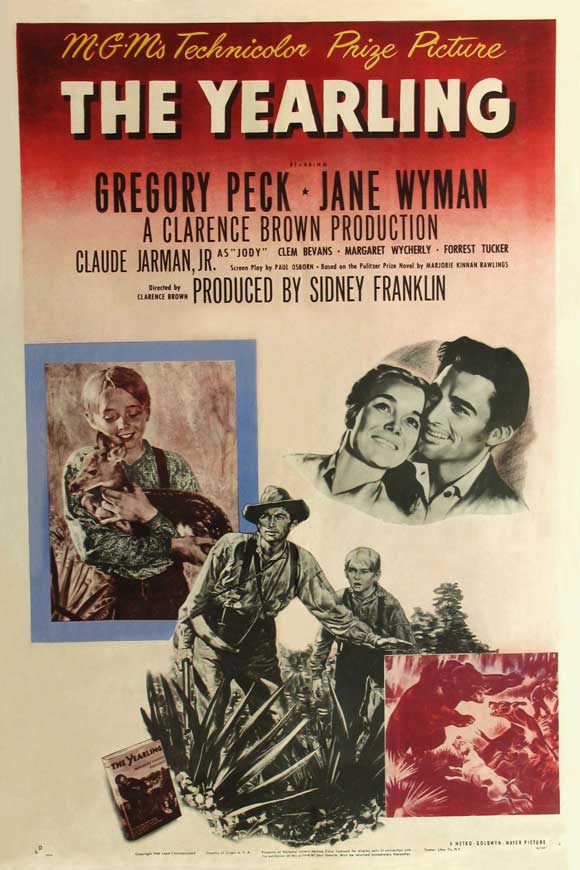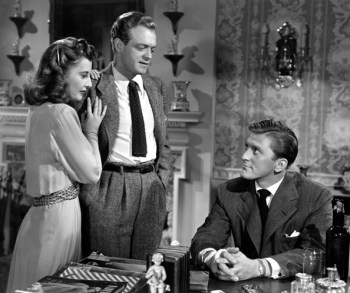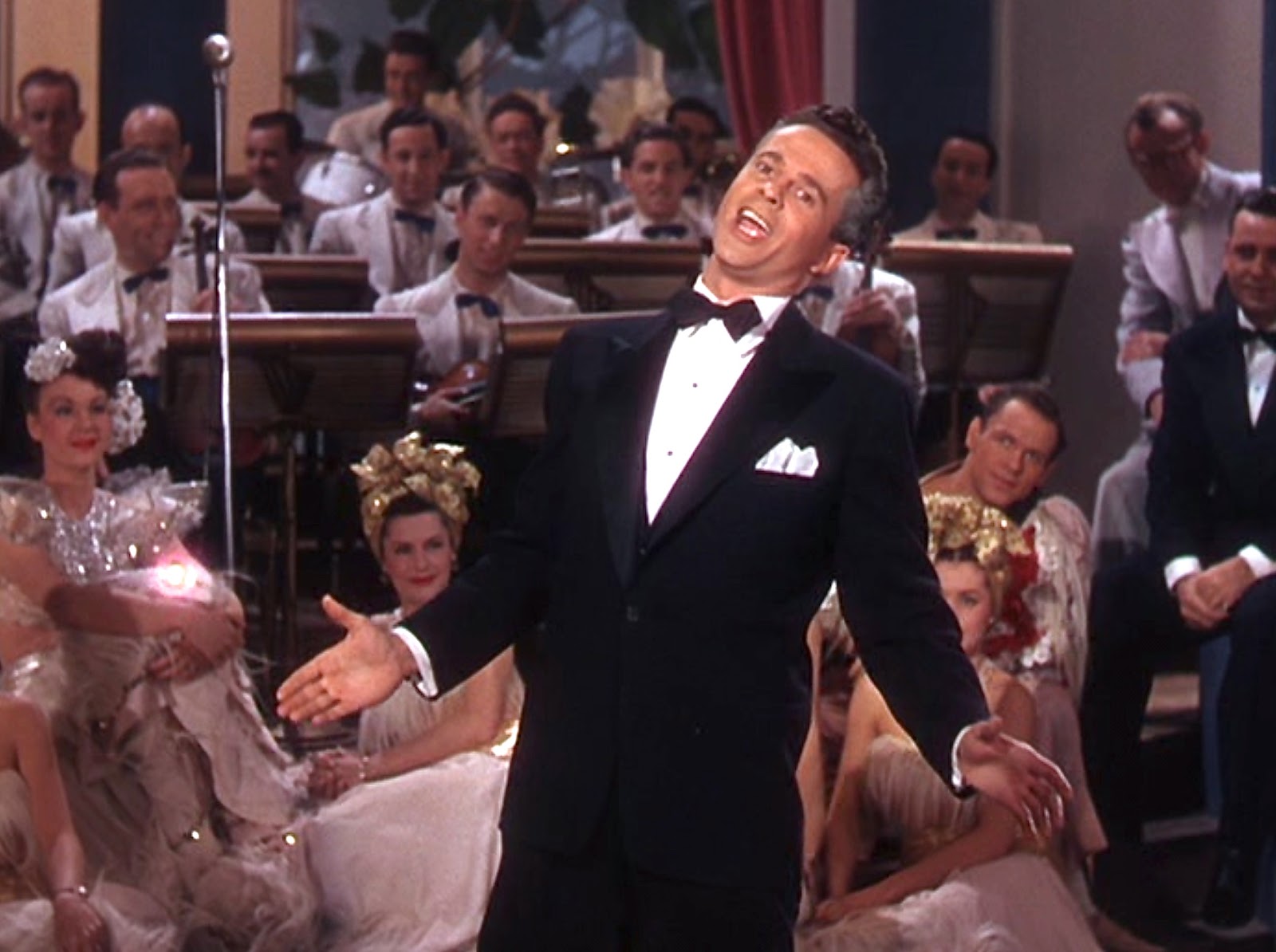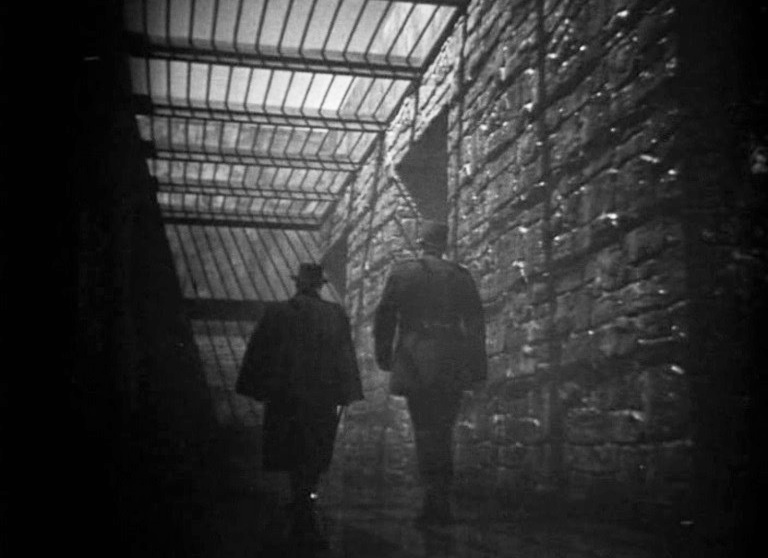Henry V came out in April. The American studios, after almost twenty years at the game, knew too well that a late-in-the-year release bettered the odds of getting a Best Picture nomination. They weren't wrong: the other four Best Picture nominees all made their LA debuts within seven days of each other.
Beginning with The Yearling, which wound up becoming the #10 film of 1946. Based on the novel by Marjorie Kinnan Rawlings, it's the story of a farming family in a remote area of South Florida - Cross Creek covers Rawlings' time at the place that inspired the book. The protagonist is a boy who befriends a deer; Pa allows him to still a boy in some respects while teaching him to be a man in others; Ma is the unhappiest woman in Christendom. Although it wouldn't hit New York until after the new year, it debuted in LA on December 18th.
The rest of the slate all dropped within 24 hours of each other. On Christmas Eve, holiday favorite It's a Wonderful Life made its LA debut, four days after its NYC bow. The very next day, Angelenos finally got to see The Best Years of Our Lives, a three-hour drama about veterans adjusting to life at home, which had played in New York since November. It wound up as the #1 movie of the year - and the Best Picture Oscar winner. The Razor's Edge also came out on Christmas Day: the heady drama about a man seeking enlightenment amid the tragedies of the friends around him ended its run as the #7 movie of the year - yes, higher than It's a Wonderful Life, which was not an immediate success!
The only other films that competed with them those days were Humoresque (December 25) and, at the very last minute, Duel in the Sun (December 31). Those two and the rest of the Fall-Winter programming, right now:
Monsieur Beaucaire
release date: September 4
The King's barber trades places with a lothario, and honey, war between France and Spain is imminent. . Bob Hope vehicle with three random musical numbers, one of them very good, and an amusing fight sequence. Never really matches Hope's introduction scene, one of the better suicide-as-comedy scenes.
Caesar and Cleopatra
release date: September 6
nominee: Best Art Direction - Color
By George Bernard Shaw, a full-color dramatization of the relationship between aging Julius Caesar and young, petulant Cleopatra posits that their relationship was not sexual so much as it was intellectual, with Caesar a political mentor. Vivien Leigh plays the role correctly, but there is something unusual about her performance that I can't quite put my finger on. She was 32 at the time, and while that's not old, it's a little adult to try to pull off what this Cleopatra does, but I admire that she really goes for the childishness. Off in a memorable, fascinating way. The color cinematography wows, deep blues and seductive tangerines, partnered beautifully with the sets, costumes, and makeup. Intelligent, hilarious screenplay. And, best of all, Claude Rains as Caesar, a rare leading gig for him that, once again, proves him to be one the greatest in the game.
The Strange Love of Martha Ivers
release date: September 13
nominee: Best Original Story (John Patrick)
Guy returns to the town he ran away from, to find an old flame still carrying a torch, though she and her D.A. husband are desperate to hide a secret from the past. Barbara Stanwyck is the femme fatale, so you already know it's good, but Van Heflin's the star - and an excellent star turn he gives, too! Great fun!
The Jolson Story
#3 film of 1946
release date: October 10
winner: Best Musical Score (Morris Stoloff), Best Sound Recording
nominee: Best Actor (Larry Parks), Best Supporting Actor (William Demarest), Best Art Direction - Color (Joseph Walker), Best Editing (William A. Lyon)
You know, I've watched a lot of films from the 30s and 40s, and I can't remember seeing this much blackface as in 1946. Was it something about the post-War desire for a return to normalcy? But we've got the "Dark Town Strutters' Ball" number in The Dolly Sisters, Flora Robson in Saratoga Trunk and Caesar and Cleopatra, and now this biopic of Al Jolson, a great singer whose trademark was "blacking up." It's a cut above other such biopics due to its smart writing and fine performances - the way it handles the impending divorce between Jolson and the composite wife figure is especially great, and I love his cantor father, and Parks is phenomenal - but gosh, it's alarming from a 2022 vantage point to see so much blackface!
Sister Kenny
release date: October 10
nominee: Best Actress (Rosalind Russell)
Bio of the Australian nurse who challenged medical authorities with her treatment for infantile paralysis. The makeup on Russell as she ages is well done. The movie is dull.
Blue Skies
#4 film of 1946
release date: October 16
nominee: Best Musical Score (Robert Emmett Dolan), Best Original Song ("You Keep Coming Back Like a Song")
Fred Astaire is a performer, so is Joan Caulfield, and much to Fred's chagrin she falls for will-o'-the-wisp nightclub impresario Bing Crosby. Doesn't always perfectly incorporate its Irving Berlin songbook (Berlin came up with the story, apparently). As a story, I really liked the way it approached, hm, marital challenges, the clash of dreams with reality, and fidgety fellas.
My Darling Clementine
release date: October 17
Wyatt Earp comes to Tombstone, befriends Doc Holliday (not without some territorial tension), runs afoul of a cattleman and his boys. Directed by John Ford, so I shouldn't have to say more, and yet one does not want to walk away without chef-kissing the beautiful shot of a tubercular Doc Holliday silhouetted against the pre-dawn window, Walter Brennan's steady menace, the coziest saloon with the longest bar you've ever seen, Henry Fonda's unsubtle flirtation with Clementine, the final shootout, the church-raising dance. Gosh, it's a damn fine film.
The Dark Mirror
release date: October 18
nominee: Best Original Story (Vladimir Pozner)
A psychiatrist courts twin sisters to figure out which of them is to blame for murder. Olivia de Havilland plays the sisters, and I don't think she knows the difference between them. Dismissable.
Magnificent Doll
release date: November
Widowed Dolly Payne Todd starts a boardinghouse in D.C., where she's courted by an increasingly entitled Aaron Burr and the more reserved James Madison. Burr takes her drinking and smooches her, but Madison actually engages with her mind, discusses politics, defers to her wisdom and social abilities in some matters. Hagiography? Perhaps - the depiction of the Madisons as #1 abolitionists who believe the best person to carry out their policy is Thomas Jefferson feels like it's missing a lot of complexities. David Niven's Aaron Burr going from ambitious charmer to megalomaniacal madman is nutso, but I'm not studied enough in that area of history to cry foul. My main concern is whether or not this all works as a movie, and on that score, I loved it. Oh my goodness, I was in from the "AND Burgess Meredith" credit all the way to "THE END."
Nobody Lives Forever
release date: November 1
John Garfield gets out of the army and goes back to the con game, getting involved in a fleecing of a young widowed millionaire - but then he falls in love with her! Nice boy noir with a solid cast of character actors and few surprises. Ah, but I don't always need to gasp, I'm fine just settling in with well-made work featuring some favorites.
Children of Paradise
release date: November 15
nominee: Best Original Screenplay (Jacques Prévert)
Three-hour epic about theatrical types in 1830s Paris. Arletty is a very popular woman, Jean-Louis Barrault is the master of the pantomime who loves her, Pierre Brasseur is the conceited but charming actor who rolls about with her, Marcel Herrand is the criminal who would possess her, Louis Salou is the aristocrat who proves quite helpful to her. An unfathomable scale, an incredible story, a peerless cast. At 190 minutes...it's still too short.
release date: November 23
When an innocent man is executed, Sydney Greenstreet is forced to retire as Scotland Yard superintendent - and then more murders occur, closer to home. The solution? I don't buy it, honestly. The movie preceding it? I don't buy much of that, either, though it's fun to see Greenstreet as the lead and Peter Lorre as a lothario.
Humoresque
release date: December 25
nominee: Best Score (Franz Waxman)
John Garfield is a violin prodigy who becomes entwined with Joan Crawford, the married queen of the social set. I love the last sequence of this film, cutting between Garfield's Tristan & Isolde concert and Crawford's sob-filled walk on the beach - I, too, wept; I even watched this scene again after the movie ended. It's the culmination of well-worn melodrama territory...well-worn but well-done! The jealous momma, the disapproving-until-success poppa, the jaded mentor, the alcoholic rich folks, hail, hail, the gang's all here, and all played to perfection by a cast that includes J. Carrol Naish and Oscar Levant. The sets: Crawford's got the best beach house I've seen, and her penthouse ain't bad, either; too, the mom-and-pop grocery Naish runs, the hobby store where the violin obsession starts, Levant's flophouse studio apartment - authenticity in every detail.
Duel in the Sun
#2 film of 1946
release date: December 31
nominee: Best Actress (Jennifer Jones), Best Supporting Actress (Lillian Gish)
Jones browns up to play a mixed girl who lives with distant relatives and falls into a weird sadomasochistic relationship with Gregory Peck, but it's all done as a great sweeping epic. There's something distracting about the scale of it, like as beautiful as the cinematography and the vistas are, it's so much for what is, bare-bones, a psychosexual romance. I don't mind scale, of course, but this does not feel like the sweeping saga Selznick thinks it is.
Sunday, we start on the individual Oscar categories with Score: Anna and the King of Siam, The Best Years of Our Lives, Henry V, Humoresque, and The Killers.



















No comments:
Post a Comment